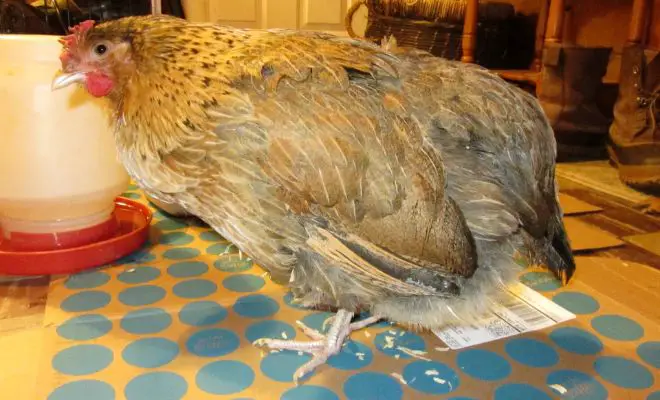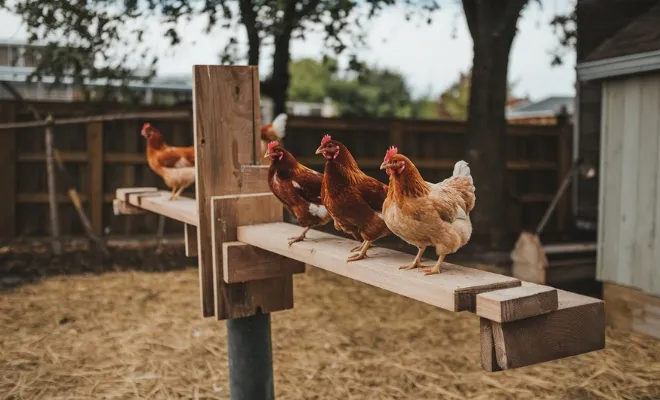Can Chickens Eat Mango? 6 Concerns You Must Know!

The sweet taste of mangoes is always delightful. How is it a treat for chickens? How are mangoes as a food in the poultry industry?
Can chickens eat mangoes safely? Yes, chickens can eat mangoes, but remove the skin and pit first. Mangoes make a nice, sweet snack for chickens. But too many mangoes may upset their stomachs. So only give them mangoes every so often. Mangoes have some chemicals that can irritate chickens’ skin, too.
Always remember to offer a balanced diet to make sure they stay healthy and happy. Twice a week might be a reasonable consideration. To know more about this, have this article completed.
Table of Contents
Can Chickens Eat Mango? Yes!
Well, chickens can eat mango. Mangoes provide vitamins, minerals, and antioxidants that can contribute to a chicken’s health.
However, chickens do not digest sugars well, so too many mangoes may cause digestive issues. As with any treat, mangoes should only make up a small part of a chicken’s overall food intake.
Can Baby Chickens Eat Mangoes?

Baby chicks can’t eat mangoes from a young age until they’re at least 12 weeks old. So, chicks should not eat mangoes exclusively.
They require high protein crumble feed for proper growth and development. So, avoiding feeding mangoes to your chicks is best!
What If I Feed Chickens Mango Every Day?
Feeding chickens mangoes every day is not recommended. The high natural sugar content can upset digestion when eaten regularly or in excess.
Diarrhea, intestinal inflammation, weight gain, and fatty liver disease can occur as well. For optimal chicken health and egg production, mangoes should be fed sparingly, once to twice a week at most.
Can Chickens Eat Mango Skin?
Yes, mango skin is no problem for chickens. If the skin is peeled off and the fruit is well chopped, chickens can easily consume those.
Here’s a video showing chickens eating mango skins:
Can Chickens Eat Mango Pits?
The mango peel is fibrous and challenging for chickens to digest. Although pits are nutritious! These pits can have a chemical called cyanide that can make chickens very sick if eaten.
Cyanide is toxic to chickens’ hearts. For these reasons, chickens should avoid mango peels altogether. Stick to feeding chickens diced mango flesh instead.
Can Chickens Eat Mango Seeds?
Mango seeds can cause digestive upset or obstruction in chickens if swallowed whole. The seed should be removed before feeding mango fruit to chickens.
Can Chickens Eat Mango Leaves?

Eating mango leaves is not recommended for chickens. While not toxic, mango leaves provide minimal nutrients compared to the fruit. They also contain unpleasant-tasting compounds that deter chickens from browsing on them in nature.
There is no benefit to letting chickens eat mango leaves versus other greens.
Do Chickens Eat All Forms of Mango?
Chickens can eat ripe, unripe, and even overripe mango fruit safely. Mangoes do contain more sugar as they ripen, so unripe green mangoes might make a healthier option. Anyway, unripe mangoes might be a little bit hard for the chickens. So, practice caution while feeding them green mangoes and look for any allergic reaction.
As far as prepared mango products, chickens can occasionally have small treats like mango juice, pulp, or popsicles on hot summer days.
But fresh mango flesh makes the best, most nutritious choice.
Nutritional Profile of Mangoes
Let’s take a look at the nutritional value of mangoes. Here’s a list of nutrients for every 100g of mango, according to USDA.
| Nutrient | Amount | Unit |
|---|---|---|
| Water | 83.5 | g |
| Energy | 60 | kcal |
| Energy | 250 | kJ |
| Protein | 0.82 | g |
| Total lipid (fat) | 0.38 | g |
| Ash | 0.36 | g |
| Carbohydrate, by difference | 15 | g |
| Fiber, total dietary | 1.6 | g |
| Sugars, total including NLEA | 13.7 | g |
| Sucrose | 6.97 | g |
| Glucose | 2.01 | g |
| Fructose | 4.68 | g |
5 Benefits of Feeding Mangoes to Chickens
You have already got to know all the benefits of feeding mangoes. I won’t say mangoes give them huge benefits. It’s quite a few in number. Let’s have a look at the list of benefits given below.

- Provides nutrients like vitamins A, C, E, K, and B6. All these are good for the immune system and prevent cellular damage.
- Excellent source of disease-fighting antioxidants.
- Boosts levels of carotenoids for richer egg yolks.
- Natural sugars offer quick energy. In addition, adds flavor and variety to the diet.
- Encourages foraging habits as well.
6 Concerns of Feeding Mangoes to Chickens
Overfeeding mangoes to chickens can cause some issues. Here are what the issues might be.
1. Diarrhea
The high sugar content in mangoes and excessive feeding may give chickens loose, watery droppings. This diarrhea can lead to dehydration and needs to be treated by removing mangoes and providing electrolytes.
2. Digestive Upset
Mangoes are acidic and can irritate chickens’ stomachs and intestines if consumed excessively. It can also cause discomfort, inflammation, or difficulty digesting other nutrients properly.
3. Weight Gain
The extra calories and carbohydrates in mangoes may lead to excessive fat deposits and obesity in chickens over time. Their bodies cannot burn off overfed sugar efficiently.
4. Declines in Egg Production
Obesity, diarrhea, and other effects from too much mango can take the chicken’s focus away from prime egg laying. They can be stressed. On top of that, nutritional deficiencies or illness may also reduce egg numbers.
5. Fatty Liver Disease
The liver stores excess sugar and fat. Overfeeding sugary mangoes leads to dangerous fat accumulation that disturbs normal liver function.
6. Decreased Feed Consumption And Nutrition
Chickens lose their appetite When they fill up on too many sweet, watery mangoes. Decreasing appetite for balanced feed and protein sources required to stay healthy is a big concern. Lack of proper nutrition causes its own problems.
How to Serve Mangoes to Chickens?

Here are my feeding suggestions.
- Wash the mangoes first.
- Remove pits/seeds, which can cause choking.
- Chop the mangoes into small, manageable pieces.
- Place chopped mango in a separate dish or scatter directly in the chickens’ enclosure. Provide adequate feeder space for all birds to access.
How Much Mango to Offer Chickens?
Feed mangoes to chickens in moderation, as a treat. Allow 1 to 2 small diced mangoes for every 5-10 chickens per feeding. Adjust amounts based on chickens’ interest and to avoid waste.
How Often Should I Feed Mango to Chickens?
Feeding mango 1-2 times per week is sufficient for most backyard flocks. Monitor chickens after eating to ensure normal behavior, droppings, etc.
Lessen mango frequency if any signs of digestive upset occur. Chickens with a balanced diet may only need mangoes 1-2 times a week as a flavorful, nutritious supplement.
Recommended readings:
FAQs
Have a look to see if any of the curious questions about mangoes in the chicken diet are here!
Q: Can chickens eat mangoes at night?
Yes, chickens can eat mangoes at night, just as during the day. But removing treats by dusk allows them to digest before roosting.
Q: Do chickens like mangoes?
Most chickens enjoy the sweet flavor of ripe mangoes. They will happily forage chopped mango pieces mixed into their enclosure.
In Summary
So, the response is expected. Can chickens eat mangoes? Yes. In moderation, mangoes make a safe, nutritious supplement to a chicken’s diet. Limit high-sugar fruits to occasional treats. Support digestion and balance mango’s nutrition with species-appropriate feed, access to greens, and grit.
Follow proper feeding guidelines for your favorite backyard birds. For this, the above tips are enough to feed your chickens properly. However, give them treats like mangoes and let them enjoy a variety of flavors while optimizing their health.
Sources And References:
- https://www.sciencedirect.com/science/article/pii/S1658077X21000655
- https://opensanctuary.org/things-that-are-toxic-to-chickens/






